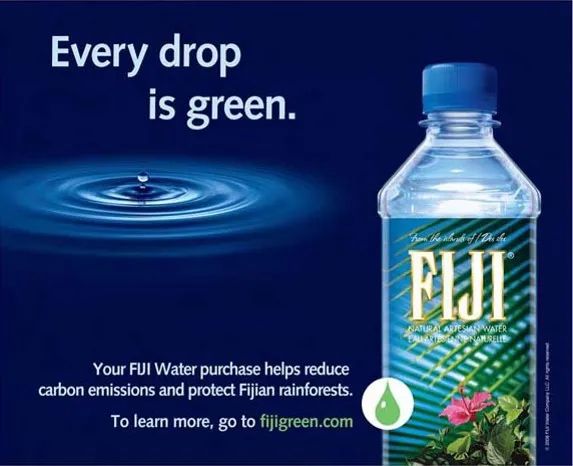Desiree Worthington, a Santa Ana resident, accused Fiji Water of being involved with “forward crediting,” which is the practice of effectively taking credit for carbon reductions that haven’t yet occurred. According to her lawsuit, Fiji Water falsely claimed to be “carbon negative” on their website, so she ended up paying twice as much for the water.
A premium artesian bottled water company in the United States, FIJI Water launched a Carbon Negative campaign that marketed the company as eliminating more greenhouse gas emissions than were created by the corporation’s operations and products in an effort to go beyond worldwide best practices in decreasing environmental impacts. The campaign had a drop of water on the top left hand corner and a text on the top of it saying that ‘every drop is green’ the following sentence shows that the company aims to present to be eco friendly and every single drop of their bottled water is in a direct or an indirect way contributing towards helping the environment. An element of the photo that conveys the impression is the little green coloured drop of water on the bottom left of the bottle itself which in a way represents that they are sustainable. The statement made by the company in the bottom ‘Your Fiji Water purchase helps reduce carbon emissions and protect Fijian rainforests.’ makes a significant appeal towards the audience to promote the brand on being Environmentally conscious.
“Our existence has been a strong net positive for the economy of Fiji, and we don’t want to be any less than that on climate change,” stated Thomas Mooney, who became the first senior vice president for sustainable growth at Fiji Water in July 2007. The Company also committed funds to preserve the Sovi Basin, an extensive lowland rainforest owned by local Fijians and home to numerous rare plant and animal species, as well as to safeguard the Yaqara Valley watershed, which serves as the primary supply of Fiji Water. The following decisions were made public only after the summer in which the brand was targeted by numerous environmental groups. While Mooney acknowledged that Fiji’s preparations had been in the works for some time, he acknowledged that the country had to “rethink the value” of making its efforts public due to the “media environment” of the summer.
Lead attorney for the class-action lawsuit, Scott J. Ferrell, claims that he wants Fiji Water to stop bending its environmental record to increase the sales of their overpriced bottled water. It is immoral for Fiji Water to charge double the price of its competitors by making consumers think that drinking Fiji Water helps the environment, when in reality it’s not the truth.
Bibliography
Quraishi, Jen. “Fiji Water Sued for Greenwashing.” Mother Jones, January 7, 2011. https://www.motherjones.com/politics/2011/01/fiji-water-sued-greenwashing/.
Gino, Francesca, Michael W Toffel, and Stephanie van Sice. “Fiji Water: Carbon Negative?” Faculty & Research – Harvard Business School, June 2011. https://www.hbs.edu/faculty/Pages/item.aspx?num=40654#:~:text=Seeking%20to%20go%20beyond%20global,the%20company%27s%20operations%20and%20products.
Deutsch, Claudia H. “Fiji Water Vows to Go Carbon Negative.” The New York Times, November 7, 2007. https://www.nytimes.com/2007/11/06/business/worldbusiness/06iht-water.4.8216299.html.


Provide Feedback